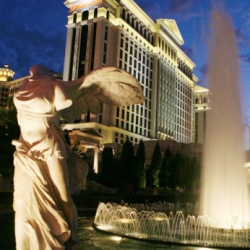Caesars Entertainment will buy an affiliate which will help the company with a reorganization plan. The affiliate will help one of the company’s divisions, while balancing its debt load for the time being.
When the company adds Caesars Acquisition Co., the move will provide Caesars Entertainment with $1.7 bilion in cash. That money will help Caesars Entertainment guarantee loans in a proposed bankruptcy deal it pitched to creditors recently. The operating division of Caesars Entertainment is operating under heavy debt, with the company having an estimated $22 billion to $23 billion in debt total.
Debt Reduced by Almost $10 Billion
According to Fortune, Caesars Entertainment’s operations division (Caesars Entertainment Operation Co. or “CEOC”) has about $18.4 billion in debt. Under a bankruptcy plan is seeks to file in January 2015, the division will have debt reduced to a more manageable $8.6 billion. Part of that plan is Caesars Acquisitions Co.
No Other Divisions Affected
CEOC says that the other units of the company, including Caesars Entertainment, Caesars Growth Partners, Caesars Interactive, and Caesars Entertainment Resort Propertie, will not be a part of the bankruptcy process. CEOC said on December 15 it would not pay $225 million in bond interest payments, which triggered a default on that debt.
On December 26, Caesars signed a deal with all members of its first lien noteholder steering committee, said the company. Under the agreement, the major creditors agreed to allow the CEOC split into two companies: the old operating company and a new publicly traded real estate investment trust, which will own a newly-formed property company. The publicly-traded real estate investment trust will generate cash from the sale of shares, which is hoped to provide the money to pay off creditors and reduce debt.
Debt Interest Payments Reduced by 75%
Under the plan, annual interest expenses will be cut to about $450 million, down from the previous amount of about $1.8 billion. Those interests payments have begun to mount to an unsustainable amount, as it soaked up too much revenue and limited growth possibilities. By trading more shares, the debt burden is carried by a new class of shareholders.
News of the Dec. 26 agreement caused shares of Caesars Entertainment to increase by 2.4% on the Nasdaq on Friday, up to a value of $1.90 billion. Stock had fallen by 1% since November 13, the day before Caesars announced that CEOC would need restructuring.
2008 Buyout of the Company
The debt burden Caesars Entertainment carries stems from a leveraged buyout in 2008 by Apollo Global Management and Texas Pacific Group. Caesars Entertainment was named Harrah’s Entertainment at the time, though Harrah’s had purchased Caesars in 2005. The new management changed the company’s name to Caesars Entertainment in 2010, because that was the most famous brand name in the corporation’s holdings.
When Apollo Global and Texas Pacific purchased the company in January 2008, it assumed about $20 billion in debt. The purchase came 8 months prior to the stock market crash and resultant Global Recession, which threw off all manner of financial calculations. Saddled with over $20 billion in debt, the previously healthy gaming company has struggled ever since.
Caesars Versus Its US Competition
Despite its financial burdens, most of Caesars Entertainment’s casinos continue to be highly profitable. Caesars is the single largest owner of American casinos, and many see the underlying business model as sound. In fact, once the company can reorganize its divisions, Caesars Entertainment could emerge as a strong competitor to its major U.S. rivals: Las Vegas Sands Corporation, MGM Resorts, and Wynn Resorts.
Those three companies are heavily invested in the Macau gaming market, which have been the source of those company’s amazing gains on stock price. Xi Jinping’s corruption crackdown in China has caused revenues of those casino operations to drop 50% in the past six months, so those gaming companies are being hit with trouble beyond their ability to fix. Whether the Macau gaming market will be permanently harmed by the corruption investigations is uncertain, but that has caused investors to sell off shares of those companies at an alarming rate. Las Vegas Sands has lost 30% of its value in 2014.

